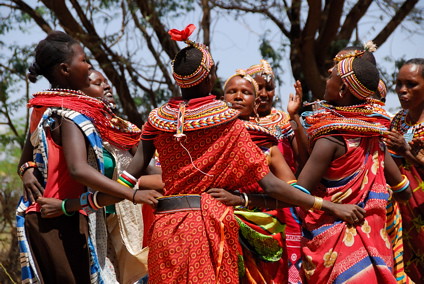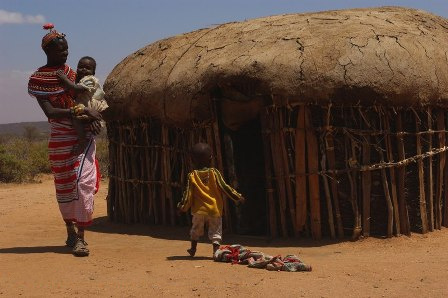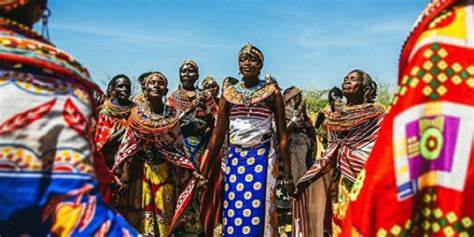
Umoja, a village nestled in Kenya’s Samburu region, stands out as a unique and empowering sanctuary for women. This all-female community has been a refuge for those fleeing the patriarchal norms and abuses prevalent in the surrounding society.

A Community Born from Trauma and Resilience
Umoja was established over 30 years ago by Rebecca Lolosoli and 15 other women who had experienced violent encounters, including rape by British soldiers stationed nearby. Stigmatized and rejected by their own communities, these women banded together and found a piece of land to create their own haven, naming it “Umoja,” which means “unity” in Swahili. The village has since grown into a safe haven for women escaping a range of societal ills, including female genital mutilation (FGM), domestic abuse, and child marriage.Umoja has become a refuge where women can find the freedom and support they were denied in their previous lives.
A Safe Haven in a Patriarchal Society
The Samburu community, to which the women of Umoja belong, is deeply patriarchal, with practices such as FGM and polygamy deeply entrenched.6Within this context, Umoja stands as a radical departure, a community where women are in complete control and men are strictly prohibited from residing. The village is surrounded by thorny fences to keep intruders out, and the women promptly notify the local police if any men attempt to enter. This level of protection and autonomy is a stark contrast to the realities many of these women faced in their previous lives, where they were often subjected to violence, abuse, and a complete lack of agency.

Economic Empowerment and Education
The women of Umoja have found ways to sustain themselves and their community, primarily through the sale of traditional Samburu beadwork to tourists visiting the nearby Samburu National Reserve. They also manage a campsite, further contributing to the village’s economic self-sufficiency. Importantly, the income generated is pooled and redistributed by the village matriarch, Rebecca Lolosoli, according to the size of each household. This ensures that the funds are used to meet the community’s collective needs, such as education for the children. The village’s commitment to education is exemplified by Rosalina Learpoora, an 18-year-old resident who attends a nearby high school. Learpoora’s story highlights the transformative power of Umoja, as she would have likely been forced to undergo FGM and an early marriage had she not found refuge in the village.

Challenges and Criticism
While Umoja has empowered many women, it has also faced criticism from some in the surrounding communities. Some have accused the women of being too radical or using the village as a way to make money. Additionally, the village faces ongoing challenges, such as the periodic theft of the women’s cattle by local men. This demonstrates the broader societal tensions and the deeply ingrained patriarchal norms that the women of Umoja continue to navigate and resist.
Despite these challenges, the women of Umoja remain steadfast in their commitment to their community and their mission of providing a safe haven for women in need. As Rebecca Lolosoli states, “I have no regrets for what I have done. In fact, I am proud that I contributed towards betterment of other people’s lives. I will march on until men recognize and respect the human being called woman and her role in society.”
The Spread of the Umoja Model
The success and resilience of Umoja have inspired the creation of similar all-female villages in the region, each with its own unique approach. This suggests that the Umoja model is resonating with women seeking to challenge the patriarchal structures that have long dominated their communities. These villages, such as Nang’ida, which means “happiness” in Swahili, offer alternative models where men are allowed, but only if they abide by the women’s rules. This diversification of approaches demonstrates the growing momentum and empowerment of women in the region, as they assert their right to self-determination and collective well-being.
The women of Umoja engage in several economic activities to sustain their community:
Selling Traditional Samburu Crafts
- The women are skilled in creating traditional Samburu beadwork, including colorful jewelry, necklaces, and other accessories.
- They sell these handmade crafts to the steady stream of tourists visiting the nearby Samburu National Reserve.
- The income generated from these craft sales is a significant source of revenue for the village.
Operating a Campsite for Tourists
- The women of Umoja also run a campsite for tourists visiting the Samburu National Reserve.
- Tourists can stay overnight at the campsite, providing another stream of income for the village.
Collective Economic Cooperation
- The women pool their earnings from the craft sales and campsite operations.
- The village matriarch, Rebecca Lolosoli, then redistributes the funds to support the needs of each household based on the number of children.
- This collective economic approach ensures that the community’s resources are shared equitably.
Additional Income Sources
- Some women in the village also engage in other economic activities, such as selling a home-brewed low-alcohol beer analogue.
- The village has also received financial aid and support from NGOs and donors over the years, which has contributed to its economic sustainability.
Overall, the women of Umoja have demonstrated remarkable entrepreneurial spirit and resourcefulness in finding ways to support themselves and their community through a variety of economic activities, centered around their traditional crafts and tourism. This economic empowerment has been a crucial factor in enabling the women to maintain their independence and autonomy within the village.







